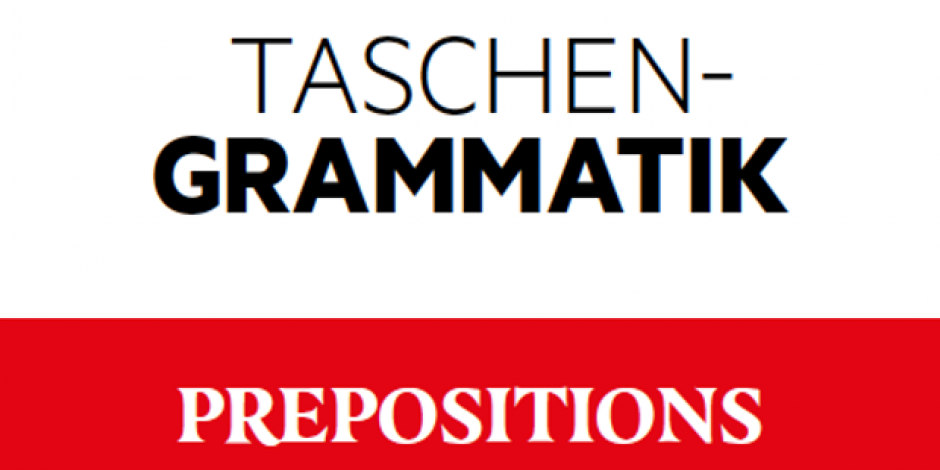In March's booklet on prepositions, we present a number of verbs whose meaning changes depending on the preposition we use. Here, you can find the translation for each example from pages 16–19 of the booklet.
When you’ve finished looking at these translations, test your knowledge of multi-word verbs with our exercise:
Do
- We’re doing up the living room — new furniture and new wallpaper.
Wir renovieren das Wohnzimmer — neue Möbel und neue Tapeten.
- The UK did away with hanging more than fifty years ago.
Großbritannien hat vor über fünfzig Jahren die Hinrichtung durch Erhängen abgeschafft.
- I’m on a diet so I’ll have to do without dessert.
Ich mache gerade eine Diät, also muss ich auf den Nachtisch verzichten.
- I could do with some help.
Ich könnte etwas Hilfe gebrauchen.
- She has nothing to do with her neighbours. They don’t even speak to each other.
Sie hat nichts mit ihren Nachbarn zu tun. Sie reden nicht einmal miteinander.
- Do up your seat belt before the plane takes off.
Schnallen Sie sich an, bevor das Flugzeug abhebt.
Get
- I get on well with my colleagues.
Ich komme mit meinen Kollegen gut zurecht.
- It’s easy to get around Munich. The public transport is excellent.
In München kommt man leicht herum. Die öffentlichen Verkehrsmittel sind großartig.
- The whole family always gets together at Christmas.
Die ganze Familie trifft sich immer zu Weihnachten.
- What time do you get up on Sundays?
Wann stehst du sonntags auf?
- He’s nearly eighty. He’s getting on.
Er ist fast achtzig. Er wird langsam alt.
- When does she get back from Rome?
Wann kommt sie aus Rom zurück?
- I got out of going to the meeting. I said I was ill.
Ich bin um das Meeting herumgekommen. Ich sagte, ich sei krank.
- He completely got away with stealing the ring. He was never punished.
Er kam mit dem Diebstahl des Ringes davon. Er wurde nie bestraft.
- Her pension isn’t very generous, but it’s enough to get by on.
Ihre Rente ist nicht sehr großzügig, aber es reicht, um damit auszukommen.
- This awful weather is really getting me down.
Dieses fürchterliche Wetter macht mich wirklich fertig.
- I got on the bus at Victoria and got off at Marble Arch.
Ich bin am Victoria Bahnhof in den Bus gestiegen und in Marble Arch ausgestiegen.
- I got into the taxi at the station and got out at my hotel.
Ich stieg in das Taxi am Bahnhof ein und stieg an meinem Hotel aus.
- I’ll never get through all this work before six o’clock.
Diese ganze Arbeit werde ich niemals bis sechs Uhr schaffen.
- He’s getting over the operation slowly.
Er kommt langsam über die Operation hinweg.
- Get out of the way!
Gehen Sie aus dem Weg!
- I was off sick and got behind with my work.
Ich war krank und kam mit meiner Arbeit in Verzug.
- I’ll get back to you as soon as possible.
Ich werde mich so schnell wie möglich bei Ihnen melden.
Give
- Don’t give up! You’ll succeed in the end.
Gib nicht auf! Letztlich wirst du Erfolg haben.
- They’re giving away roses at the new supermarket.
Sie verschenken Rosen im neuen Supermarkt.
- You win! I give in.
Du hast gewonnen! Ich gebe auf.
- I know it’s a secret. I won’t give it away.
Ich weiß, dass es ein Geheimnis ist. Ich werde es nicht verraten.
- How did you manage to give up smoking?
Wie haben Sie es geschafft, mit dem Rauchen aufzuhören?
- The kidnapper gave himself up to the police.
Der Entführer hat sich der Polizei gestellt.
Look
- Look out! There’s a car coming!
Pass auf! Da kommt ein Auto!
- Look up the word in your dictionary.
Schlag das Wort in deinem Wörterbuch nach.
- She looks up to her big sister.
Sie schaut zu ihrer großen Schwester auf.
- Look through the papers before you sign them.
Sehen Sie die Papiere durch, bevor Sie sie unterschreiben.
- I’m looking for my dog. He ran away in the park.
Ich suche meinen Hund. Er ist im Park davongelaufen.
- Look at yourself in the mirror.
Schau dich doch im Spiegel an.
- The babysitter is looking after the child.
Die Babysitterin kümmert sich um das Kind.
- Don’t look down on me!
Schau nicht auf mich herab!
- The police are looking into his alibi.
Die Polizei untersucht sein Alibi.
- I’ll look in on Bob on my way to the shops.
Ich schaue unterwegs zum Einkaufen bei Bob vorbei.
Make
- Is that the truth, or are you making it up?
Ist das die Wahrheit, oder erfindest du das?
- After the argument, they kissed and made up.
Nach dem Streit haben sie sich geküsst und sich versöhnt.
- What do you make of this? Do you think it’s just an excuse?
Was hältst du davon? Meinst du, es ist nur eine Ausrede?
- What is that pie made of?
Woraus besteht diese Pastete?
- The thief made off with all her jewellery.
Der Dieb machte sich mit ihrem ganzen Schmuck davon.
- His handwriting is awful. I can’t make out what he’s written.
Seine Handschrift ist furchtbar. Ich kann nicht erkennen, was er geschrieben hat.
- Make up your mind!
Entscheide dich!
Put
- I always put off doing my homework till the very last minute.
Ich schiebe meine Hausaufgaben immer bis zur letzten Minute auf.
- Put away your toys before you go out to play.
Räum Deine Spielsachen auf, bevor du zum Spielen nach draußen gehst.
- How do you put up with those noisy neighbours?
Wie hältst du es mit diesen lärmenden Nachbarn aus?
- I have some money put by for a rainy day.
Ich habe etwas Geld für schlechte Zeiten zurückgelegt.
- I can put you up. I have a guest room.
Ich kann dich unterbringen. Ich habe ein Gästezimmer.
- Put on your gloves. It’s cold outside.
Zieht eure Handschuhe an. Es ist kalt draußen.
- You’ve put your finger on the problem.
Du hast das Problem erkannt.
Set
- What time do you set off for work?
Wann machst du dich auf den Weg zur Arbeit?
- She’s dead set on going to university.
Sie will unbedingt studieren.
- The quality of his work sets him apart from his colleagues, I'm told.
Die Qualität seiner Arbeit hebt ihn von seinen Kollegen ab, habe ich gehört.
- The rain set in at the beginning of the monsoon season.
Der Regen setzte zu Beginn der Monsunzeit ein.
- They set up a new company to market their products.
Sie gründeten eine neue Firma, um ihre Produkte zu vermarkten.
Take
- The baby takes after her mother. They both have the same smile.
Das Baby kommt ganz nach seiner Mutter. Die beiden haben das gleiche Lächeln.
- Why don’t you take up golf in your retirement?
Warum fängst du nicht mit Golf spielen an, wenn du in den Ruhestand gehst?
- I just could not take to my daughter’s new boyfriend.
Ich konnte an dem neuen Freund meiner Tochter einfach keinen Gefallen finden.
- Come in and take off your coat.
Kommen Sie herein und legen Sie Ihren Mantel ab.
- There was too much information. I just couldn’t take it in.
Es gab zu viele Informationen. Ich konnte sie einfach nicht aufnehmen.
- He’ll take over the firm when his father retires.
Er wird die Firma übernehmen, wenn sein Vater in den Ruhestand geht.
- I’ve taken on too much work.
Ich habe zu viel Arbeit auf mich genommen.
- The phone was faulty, so I took it back to the store.
Das Telefon war defekt, also brachte ich es zurück in den Laden.
- The policeman took down his name and address.
Der Polizist notierte seinen Namen und seine Adresse.
- Just because you’re in a bad mood, don’t take it out on me!
Nur weil du schlechte Laune hast, brauchst du es nicht an mir auszulassen!
- I took him up on his offer.
Ich nahm ihn mit seinem Angebot beim Wort.
- Don’t believe him. Take what he says with a pinch of salt.
Glaub ihm nicht. Was er sagt, ist mit Vorsicht zu genießen.
Turn
- He turned up late, as usual.
Er tauchte mit Verspätung auf, wie üblich.
- Turn on the TV.
Schalte den Fernseher ein.
- Turn over to the other channel.
Schalte auf den anderen Kanal um.
- Turn the radio up. It’s too quiet.
Dreh das Radio lauter. Es ist zu leise.
- Turn the radio down. It’s too loud.
Dreh das Radio leiser. Es ist zu laut.
- Turn it off! That programme is boring.
Schalte es aus! Das Programm ist langweilig.
- I’m going to turn in now. Good night!
Ich gehe jetzt schlafen. Gute Nacht!
- Turn to page 67.
Schlagen Sie Seite 67 auf.
- I’m going to turn over a new leaf.
Ich werde ein neues Kapitel aufschlagen.
- It turned out all right in the end.
Am Ende kam alles in Ordnung.
- Who can I turn to for advice?
An wen kann ich mich für eine Beratung wenden?



